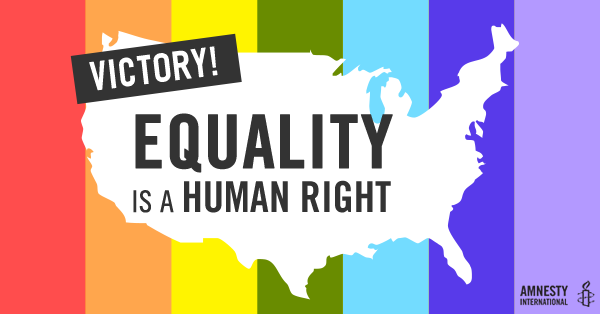
“When we got together, we didn’t think about getting married – we couldn’t really imagine that would ever be possible.”
Last weekend, I went back to North Carolina to witness the wedding of my dear friends, Mark and Scott. Today, as we rejoice in the amazing news from the U.S. Supreme Court – a tremendous victory for marriage equality and for the human rights of all people – I can’t help but think back to Mark’s words, shared deep from the heart before the 90 or so friends and family gathered to celebrate with them.
When Mark and Scott got together in 1996, such a turn of events was indeed all but unimaginable for LGBT people: while same-sex couples held commitment ceremonies to celebrate their love, no nations recognized their unions as legally equal, and only a handful of local jurisdictions offered any benefits at all to domestic partners.
Today, the Supreme Court legally recognized what an ever-growing majority of Americans understand in their hearts: that the right to marry the partner of your choice is a basic human right. Everyone has a right to be free from discrimination in the enjoyment of their human rights – including the right to marry and found a family. This is provided in Article 2 of the Universal Declaration of Human Rights and Article 2 of the International Covenant on Civil and Political Rights (ICCPR). Article 26 of the ICCPR further provides for equal protection of everyone before the law.
As Mark spoke, I couldn’t help but remember what it was like to grow up taking for granted that your love isn’t equal to other people’s love – that you, fundamentally, weren’t equal. Those days felt like ancient history as I listened to toast after toast testifying to how Mark and Scott are role models for their families, their students, and the rest of their community. Without the slightest doubt, their relationship was unequivocally equal in the eyes of their loved ones.
Now, today, the law of the land has caught up.
Amnesty International USA welcomes this ruling as a landmark step forward, not only for same-sex couples such as Mark and Scott seeking to exercise their fundamental human right to marry, but for all people, regardless of their sexual orientation or gender identity. But today’s decision in Obergefell v. Hodges is not the end of our work to guarantee the human rights of LGBT people in the United States and around the world.
Even though nationwide marriage equality has arrived, we still have no comprehensive federal ban on anti-LGBT discrimination. This means that in 31 states – including Mark and Scott’s home state of North Carolina – an LGBT person can be legally fired for legally marrying a same-sex partner.
Amnesty International USA is also alarmed by the recent rise of so-called religious liberty bills in Indiana, Arkansas, Louisiana, and other states. These proposed laws and executive orders pose a threat to the rights of LGBT people and other minorities, as they allow for arbitrary discrimination under the auspices of religious freedom.
We are also gravely concerned by the persistent danger of violence facing LGBT people every day, especially the recent wave of brutal killings of transgender women of color. Furthermore, the discrimination and violence against LGBT immigrants detained in the U.S. Immigration and Customs Enforcement (ICE) system represent a growing crisis.
Today represents a historic victory in the campaign to guarantee both the legal and lived equality of LGBT people in the United States – a triumph well worth savoring and celebrating in the weeks and months to come. Let us raise a glass to all those couples for whom the right to marry is no longer a distant dream but rather a possibility fully within grasp.
But let us not mistake the victory for the end of the road. We have much work ahead of us, and we invite you to join Amnesty International as we work to guarantee the fundamental human rights of LGBT people in the U.S. and around the world.
